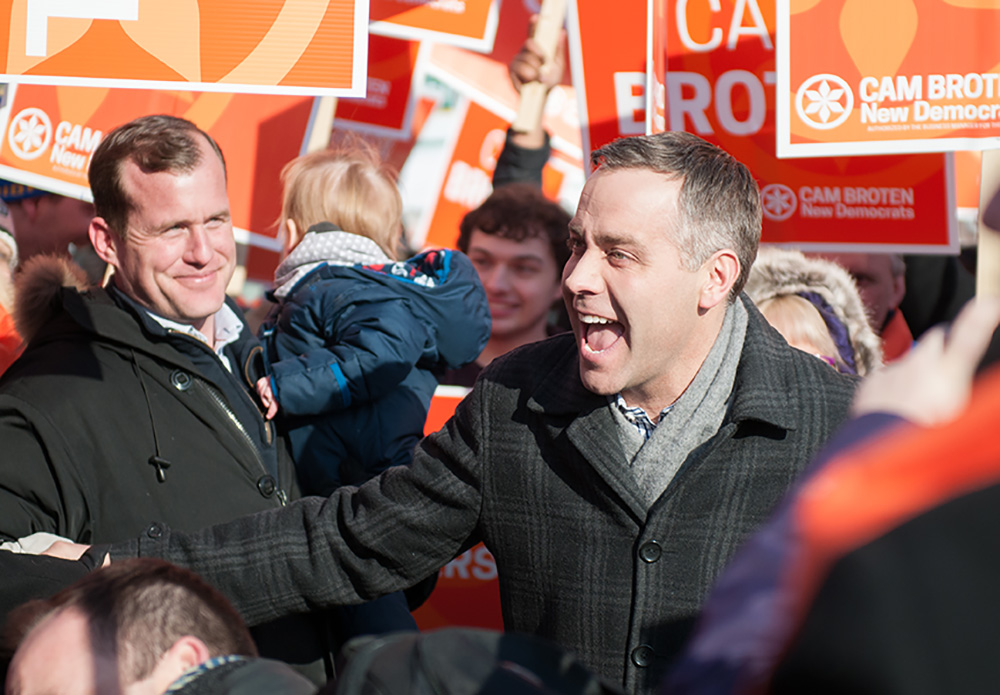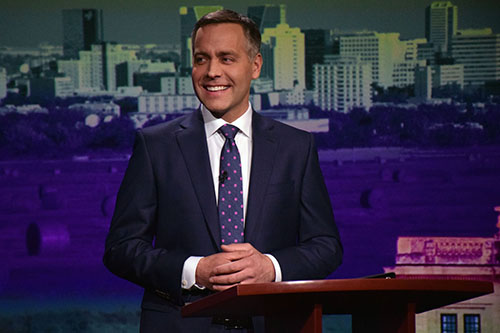Analysis by Brandon Harder
Barring catastrophe, the Saskatchewan Party look to be a shoo-in to form another majority government following the April 4 election. A struggling economy, a mounting deficit, sins of past conservatives and a strong NDP legacy should all be dogging the incumbents in the run-up to the election. But they’re not.
The Sask Party has learned valuable lessons from the past. By marketing themselves as Saskatchewan’s new economic champions, Sask Party candidates are set to hold the line.
Saskatchewan’s high-octane economy blew a tire in summer 2014 as oil prices started to slip, and the realization of a deficit followed soon after. The province’s ailing economy and partisan remedies may be the crux of the campaign.
The Sask Party isn’t able to account for how the province will make up for lost oil revenue. However, it hasn’t lost the faith of its support base and has so far avoided condemnation for the stumbling economy.
“I don’t think anybody blames Brad Wall for the fall in the price of oil or the slump in potash prices,” said Tom McIntosh, head of political science and international studies at the University of Regina.
“The question becomes, ‘Who do you think is going to manage better the way forward for the province?’” said McIntosh. “If we go by the polls, the people still seem to think that the Sask Party is the best party to manage that.”
The absence of a provincial budget may be helping to maintain voter confidence in the Sask Party. The party claims it won’t raise taxes or significantly cut spending. It also promises to return the province to a balanced budget by 2017-2018. These are bold claims without having hard numbers to back them up.
“They should’ve said more about what they’re going to actually do,” said Ken Rasmussen, professor of public management at the University of Regina. Delaying the budget was strategic, he suggested. “They certainly managed the system and managed the politics around it. As an incumbent government that’s what you can do. You can set the timing for these things. That’s what they did.”
The shadow cast by the fiscal mismanagement of the former Grant Devine Progressive Conservative government hasn’t done much to darken the prospects of the Sask Party either. Brad Wall’s success has been due, in part, by his distancing himself and his party from their conservative cousins.
His pragmatic, centrist approach to social issues has allowed him to swallow the center-right vote that used to be split between the PCs and the Liberals. Additionally, his adoption of the fiscal conservatism of his NDP predecessors allows him to offer the province the same confidence that the New Democrats have offered in the past.
In short, he and his party market themselves as the best of all worlds, which leaves the NDP with very few exclusive rabbits to pull from its hat.
This is a problem for NDP leader Cam Broten. If he does not provide a more appealing option, he must turn the province against its premier.
This may be equally challenging for the NDP leader. Unlike in the recent Alberta election, where the right wing of the province was splintered and the premier had been blaming the people of Alberta for their own misfortune, Saskatchewan’s incumbent premier enjoys unprecedented popularity and his party has a firm grip on right-of-center voters.
“They’re swimming upstream in the sense of having to contend with the popularity of the government,” said Rasmussen.
“(Broten) seems like he’s trying to be a little too sunny,” said Rasmussen. “(He’s) taking a little too many lessons from Prime Minister Trudeau, and not enough lessons from the dark side of politics – the need to really go after the government and try to tarnish the premier. They haven’t run an effective campaign.”
While appearing down to earth and personable may have worked for Prime Minister Trudeau, it was effective because it differentiated him from his adversary Stephen Harper. This is a formula that doesn’t translate to Saskatchewan because, rather than giving contrast to the race, Broten’s persona too closely mimics the image Brad Wall has already created.
When Broten does go on the offensive, as he did during the March 23 debate, he tries to appear emotionally invested, but comes across as underprepared and lacking composure. During the debate, Broten often chose to talk over Wall with ideological rhetoric, rather than striking decisive blows with facts or figures. This show of aggressive tactics may have earned him a few votes among those previously undecided, but will have done little to change the position of Wall’s support base – a change needed for Broten to make any serious advances.
“Say what you will about polling, but it’s pretty effective at getting the big picture right. The big picture has the Sask Party cruising to an easy victory,” said Rasmussen.
“That’s an easy prediction, unless something dramatic happens,” added Rasmussen.
On April 5, if the province wakes up to another Sask Party majority government, no-one should be surprised. Brad Wall and the Sask Party are outrunning the economy and have outgrown the past, while offering up promises that please most and offend few. At this point, Cam Broten and the New Democrats don’t have the appeal, the finesse, or the stomach required to turn the worm.


















